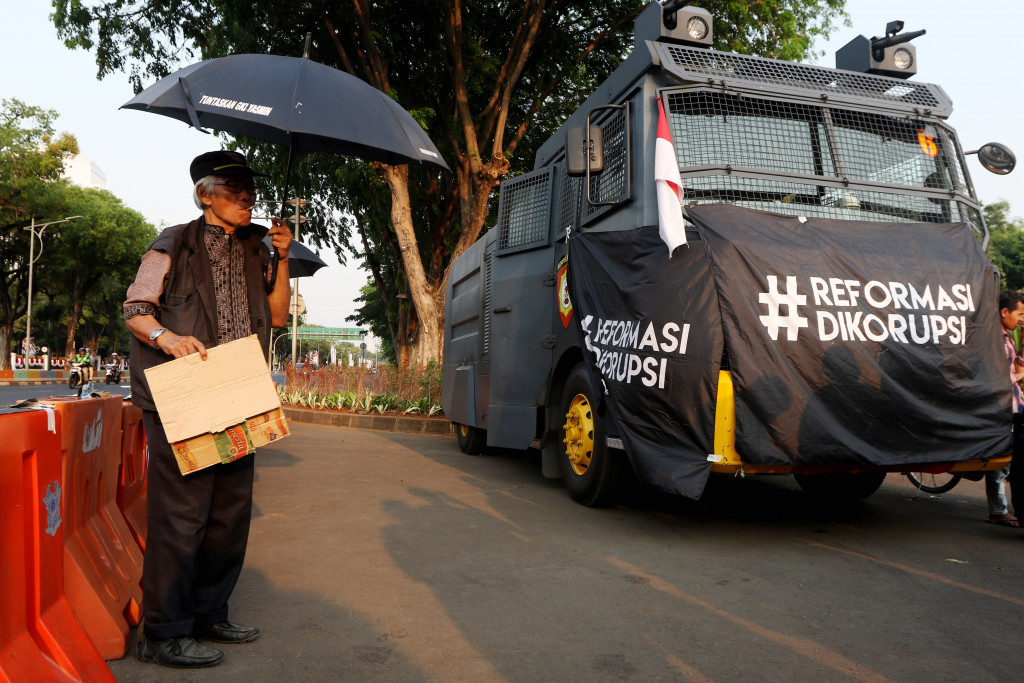Civil movements in Indonesia fail to form resilience after #ReformasiDikorupsi: Observers
Syahdan Husein, a Gadjah Mada University student who participated in last year’s #GejayanMemanggil (Gejayan is calling) rally in Yogyakarta as part of the #ReformasiDikorupsi, argued that civil movements in Indonesia were still unstructured.
Change Size
 An activist of the Solidarity Network for Victims of Justice holds a protest near an armored vehicle with a #ReformasiDikorupsi (reform corrupted) sign in front of the Presidential Palace complex in Jakarta on Oct. 24, 2019. (JP/Dhoni Setiawan)
An activist of the Solidarity Network for Victims of Justice holds a protest near an armored vehicle with a #ReformasiDikorupsi (reform corrupted) sign in front of the Presidential Palace complex in Jakarta on Oct. 24, 2019. (JP/Dhoni Setiawan)
O
n Sept. 23, Indonesia marked one year of #ReformasiDikorupsi (reform corrupted), a hashtag that accompanied last year’s nationwide street rallies against controversial bills.
Looking at the present day, however, observers say that civil movements in the country in general need to be resilient in voicing issues.
“Civil movements have failed to form resilience. They tried to bring down the [political] tension by holding an ‘Ikut Mendesak Tapi Santuy’ [Protesting but Chill] event, but in the end they lost the moment.
“The movement gradually ended as a mere press release,” the Lokataru legal and human rights foundation’s program manager, Mirza Fahmi, said during an online discussion hosted by Indonesia Corruption Watch on Wednesday.
Thousands of students took part in nationwide rallies last year to protest problematic bills in front of the House of Representatives complex in Jakarta from Sept. 24 to 30, making it the largest student movement since that of 1998, which brought down then-president Soeharto.
Students delivered seven demands last year, among them the rejection of some controversial bills including the revised KPK Law and Mining Law, resolution of human rights abuse cases and withdrawal of the Indonesian Military (TNI) from restive Papua.
According to Mirza, last year’s #ReformasiDikorupsi student protest was successful in gathering the largest mass movement in Indonesia. However, he also deemed the movement a failure, considering that none of the protesters’ demands were met.
“So, the cost for ‘reform corrupted’ is five deaths, and now violence against civil society even becomes more apparent,” Mirza continued.
Constitutional law expert from the Jakarta-based Jentera School of Law, Bivitri Susanti, said social movements in Indonesia were polarized and disintegrated one another.
“Civil movements can have different purposes, but they should consolidate the same major purpose. For example changing the governance system and so forth,” Bivitri said.
In addition, she said the public was easily satisfied with the result of 1998 political reform. “We are glad that we are granted with free elections with many political parties joining in. But that's just so wrong,” she added.
“We never criticize the political party system, for example, so those political figures we have hailed as heroes of reform are now becoming obstacles to democracy.”
She referred to how policy makers passed a controversial revision of the 2009 Coal and Mineral Mining Law in June, ignoring the outcry from civil groups who lambasted the regulation over concerns of its impact on the environment and society.
She also lambasted political elites who played a big role in passing the controversial revision to the Corruption Eradication Commission (KPK) Law in October last year.
Read also: '#ReformCorrupted'
“This has been the result of our wrong choice,” she added.
Syahdan Husein, a Gadjah Mada University student who participated in last year’s #GejayanMemanggil (Gejayan is calling) rally in Yogyakarta as part of #ReformasiDikorupsi, argued that civil movements in Indonesia were still unstructured.
“For example, in the form of collective funding last year, Jakarta activists raised hundreds of millions in cash, but they never distributed it to the civil movements in other regions,” he said, implicating that the social movement is also still Jakarta-centric.









